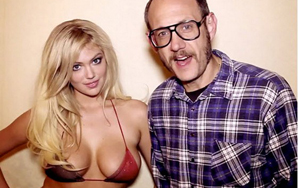
Kate Upton Is “Fat”: Why I’m Tired Of Competing With Other Women
I know that, personally speaking, I am guilty on countless occasions of passing judgment about another woman's looks, of putting her into a category of some kind or making assumptions about her habits, lifestyle, or even the kind of person she is.
A few days ago, an acquaintance of mine posted a link to this take-down of Kate Upton’s body on my Facebook news feed. The friend was a man, and his commentary was what can only be described as amicably oblivious, something along the lines of, “I think she looks great!” I think we can all agree, even if her particular style isn’t our cup of tea, that Ms. Upton looks pretty objectively great and that this “article” — and the website it’s published on — deserves far more than a chuckling disagreement with their assessment of her looks and shape. Though you could argue that the understanding of the deeply problematic nature of this article is not universal, and his response to it is so light as to be frustrating, it’s clear that that a simple compliment to the woman for what he perceives to be her A-OK body type was only meant in kindness. Some people are fortunate enough to not understand why a site like Skinny Gossip is so incredibly upsetting.
It’s hard not to be on that website for more than 10 seconds and not feel a stomach-turning wave of rage and frustration about all that’s being said of these beautiful women’s bodies. How could another woman be so cruel? How could these women with rather low BMIs be publicly flogged as “fat?” Why is this site so popular? And yet, even though the initial reaction is one of anger and even blistering self-consciousness, with a bit of reflection, the more pressing question becomes: What could possibly make a woman — only identified as “working in the fasion industry… around 5’7 and 100 pounds” — feel this way about the women around her, and ultimately, about herself?
There is no secret about what looks “good” in media today. The models — male and female — are mostly lithe, tanned, tall white people who are either well-muscled (for men) or very, very thin (for women). We have endless information about the pressure people go through in the public eye to maintain a certain look, a certain presentation of a lifestyle that they may or may not be living, and we know that the consequences are often dire. As the actual public is gaining weight, the icons to which we are supposed to be looking for our beauty cues are becoming increasingly thin — a narrow body ideal on which almost all of their career rides. And while men certainly must experience feelings of inadequacy when seeing movie heartthrobs or action stars (and they have their share of body shaming — not the least of which, the mocking of less-than-enormous genitalia), it is women who are most afflicted by this profound desire to achieve an ultimately unattainable image of physical perfection.
We are told, in no uncertain terms, that we are ranked and put into a very tangible scale (she’s an eight, she’s a seven in good lighting, etc) based solely on what we look like. Other things that we might bring to the table, from intelligence to sense of humor to lived experience, fall as a very distant second to the way we present ourselves physically — and the guidelines for what is acceptably attractive seem to become narrower every day. We all know this profoundly; it’s a world and a set of stringent rules that we exist in every day and have grown so accustomed to as to forget that it’s there. Yet every time a woman calls another a “fat cow,” or “anorexic,” we’re showing with striking precision just how much these concepts of competition and ranking are so deeply embedded in the way we look at ourselves, and each other.
Paradoxically, though, many of us have also been raised in a culture that encourages us to “love our body” and be “body positive,” to feel love for ourselves and the way we look unconditionally, with a sage understanding of the things we can and cannot change, and an appreciation of the relative importance of physical beauty compared to other aspects of who we are. While we are bombarded from all sides with images of women who look flawless and a dating world that values us only as one might a delicate statue, we are expected to somehow overcome this with ourselves — and each other — to be wholly comfortable people, able to join hands and be nothing but happy and supportive for one another. And while Skinny Gossip may be an extreme example of caving to societal standards of beauty at the expense of compassion and acceptance, even so-called “body positive” blogs are often guilty of shaming a woman here or there for looking as though “she needs to eat a cheeseburger.” It’s as though, behind whatever façade of solidarity we are able to maintain, there is always a voice echoing at the back of our minds, telling us that “The prettier she is, the less pretty I am by default.”
I know that, personally speaking, I am guilty on countless occasions of passing judgment about another woman’s looks, of putting her into a category of some kind or making assumptions about her habits, lifestyle, or even the kind of person she is. I have ranked myself and considered where I stand in any group of women I happen to be in, assessing my “market value” and those of the women around me, often without even realizing it. And I would consider myself, if asked, a “body positive” person. I like to think of myself, as so many of us do, as someone who is not convinced or tricked by the images we see every day into thinking our worth can be determined by small pores or a good hip-to-waist ratio. Yet this constant, pervasive competition that I feel — that we are taught to feel — with those around us can unconsciously influence and even define so many of the interactions we have.
It’s as though we believe that attractiveness and preference and value are finite resources that we all have to divide amongst ourselves, that one woman cannot be beautiful as she sees fit without it being at the expense of someone else. We are often threatened by the flaunting of beauty we were taught not to value, just as much as we are threatened by the women that society might deem “perfect looking.” It’s a damned if you do, damned if you don’t scenario from which it feels like we can’t escape. And though the seething hatred and jealousy may rarely be so clear as it is on sites like Skinny Gossip, those cruel words coming as a slap in the face, we cannot pretend that such feelings of competition don’t exist within us all, though perhaps to a much smaller degree. That writer may have horrific words for her fellow woman, and she may revel in dragging them through the body-image mud, but we should ultimately have compassion for her, not hatred. What could possibly be sadder than a woman who has so completely buckled under the weight of societal pressure, who has become so consumed with shape and image and food and the way others look, that her life is now dedicated to making others feel ugly and herself feel temporarily vindicated? Hating her will do nothing, but trying to understand why she — and to some degree, all of us — can feel this way is perhaps the only way to confront the root of these problems, and not just the vicious symptoms.
We see things like this every day, glaring examples of the narrow, conflicting images we’re being shown, and the very human, flawed ways in which we respond to them. There are nasty articles, unflattering photos, cruel comments, and perhaps a response or two (like that of my Facebook friend) which serve to offhandedly counteract the general sentiment with some variation of “You’re just fine as you are, girls!” It’s skimming the surface of a roiling sea of jealousy and self-consciousness and anger and shame. It is the vortex in which, no matter what size or shape you are, there is always some way in which you could be better, someone who is doing it better than you, and someone who is not good enough. There is always judgment to be passed, and someone to put down to make yourself look higher up in comparison. And though it can often feel as though this is a system of negative reinforcement from which we will never escape, perhaps the first step would be acknowledging, when we see commentary and cruelty about the women around us, to not pretend it’s just one isolated woman’s opinion of another woman eating a cheeseburger. ![]()











